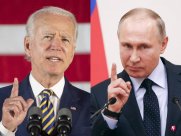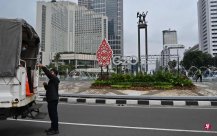Washington arranged this Sandalo Mountain talks to reiterate the United States to "return" Asia in politics and security.Blingken said before the end of the Honolulu Mountain: "The Indo -Pacific strategy reflects a basic fact that the impact of what happened in this area on the lives of Americans and the people of the world is greater than any other region in the world."
(Honolu Mountain Comprehensive Electric) The United States, Japan, and South Korean Foreign Ministers vowed on Saturday to maintain unity in response to the Asia -Pacific security threat.
U.S. Secretary of State Brills, South Korean Foreign Minister Zheng Yirong, and Japanese Foreign Minister Lin Fang held talks in Honolulu, Hawaii, focusing on the challenges of the North Korean nuclear threat and the rise of China.
On the issue of North Korea's nuclear threat, the foreign minister of the Three Kingdoms deeply concerned about Pyongyang's recent launch of ballistic missiles to destroy stability, calling on North Korea to stop illegal activities and dialogue.Blint said at a joint press conference: "We all know that North Korea is at a provocative stage."
The Foreign Minister of the Three Kingdoms said in a joint statement that the United States, Japan and South Korea are closely cooperating to "realize the Korean PeninsulaWithout nuclearization and persistence, "keeps open -minded to North Korea, and prepares to talk to North Korea without prerequisites.
Washington arranged this Sandalog Mountain talks as the third stop of Brosky Asia Pacific, aiming to reiterate the United States' "return" Asia in politics and security.The first stop of Brinken's trip was to participate in the "Quartet Safety Dialogue" in Melbourne, Australia. The second stop meeting with the 17 Pacific island leaders at Fiji.
U.S. officials said that the trip was to guarantee to the country in the pan -Pacific region, and Washington still focused on their issues.
As Brinken's visit, the White House issued 18 pages of Indo -Pacific Strategic Report, intending to emphasize the core position of the Indo -Pacific region in US foreign policy.
Brinkee said before the end of Honolulu's end of the trip: "The Indo -Pacific strategy reflects a basic fact, that is, what happened in this area, the impact on the lives of Americans and the people of the world is more than any other region in the world.Big. "
However, the Ukraine crisis scattered the focus of Brinken, and most of the time he contacted the crisis with the allies and Russian foreign ministers Lavrov.At each press conference, Brinken originally showed the United States' contribution to Asia -Pacific affairs, but the focus was on his statement that Russia might attack Ukraine within a few days.
However, AFC reported that Brins still responded positively.
In Melbourne, the United States, Australia, Japan, and India seek deepening cooperation, and expand from the initial "Marabar" with maritime military exercises and coronary vaccines to other fields, including climate change, network security, andInfrastructure and disaster relief.The Foreign Minister of the Four Kingdoms also reiterated that it was preparing to strengthen cooperation with Asianan.
In Fiji, Brinken promised to the Pacific Island country to support them in finance.The United States is also preparing to reopen the embassy closed in the Solomon Islands in 1993, which shows that Washington will pay more attention to the Pacific Island country.
A large -scale anti -China riots in the Solomon Islands in November last November. China subsequently provided riot materials to the Solomon Islands and sent police officers to assist in training local police officers. This has aroused US attention.
Pleak, director of the Pacific Island project of the Roy Research Institute in Australia, said that the second stop visit reflects that the United States does not have significant existence in the Pacific region.He said, "The United States is clearly anxious about China's growing existence in the Pacific region," so Broske's trip to Fiji is "very important".



